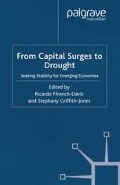Abstract
At the beginning of the 1990s the United States experienced a recession, but the US government’s large budget deficit did not allow the use of a discretionary countercyclical fiscal policy to stimulate the economy. With the elimination of budget deficits in recent years, the use of discretionary fiscal policy has re-emerged. In fact, in the face of an economic downturn the United States recently enacted a tax reform that reduced tax rates. Similarly in Chile a law to reduce personal income tax rates has been approved by the government in order to cool aggregate demand and improve efficiency. Both countries have considered expanding their fiscal expenditure to accelerate their economic recovery. Discretionary countercyclical fiscal policy again appears to be a feasible option.
An earlier version of this chapter was presented at a WIDER seminar in Helsinki, Finland, October 2001. I am indebted to Ricardo Ffrench-Davis for his excellent advice on improving the chapter. I am also grateful for the very useful remarks by Guillermo Larraín, Guillermo Le Fort, John Hawkins, Carlos Massad and José Antonio Ocampo. Of course, all remaining errors are my own.
Access this chapter
Tax calculation will be finalised at checkout
Purchases are for personal use only
Preview
Unable to display preview. Download preview PDF.
References
Auerbach, A. and D. Feenberg (2000) ‘The Significance of Federal Taxes as Automatic Stabilizers’, Journal of Economic Perspectives, 14, 3: 37–56.
Bertola, G. and A. Drazen (1993) ‘Trigger Points and Budget Cuts: Explaining the Effects of Fiscal Austerity’, American Economic Review, 83, 1: 11–26.
Blinder, A. and S. M. Goldfeld (1976) ‘New Measures of Fiscal and Monetary Policy, 1958–1973’, American Economic Review, 66, 5: 780–96.
Budnevich, C., F. Larraín and J. Quiroz (2001) ‘Sector Minero y Mercado de Capitales en Chile’, Instituto de Economía, Pontificia Universidad Católica de Chile, report prepared for the Ministry of the Economy, Mining and Energy, Chile.
Budnevich, C. and G. Le Fort (1997) ‘La Política Fiscal y el Ciclo Económico’, Revista de la Cepal no. 61, Santiago: ECLAC, April.
Business Council of Australia (1999) ‘Avoiding Boom/Bust: Macroeconomic Reform for a Globalized Economy’, Discussion Paper no. 2, Melbourne: BCA, October, 1–76.
Caballero, R. J. (2000) ‘Macroeconomic Volatility in Latin America: A View and Three Case Studies’, paper prepared for LACEA meeting, May.
— (2001) ‘Coping with Chile’s External Vulnerability: A Financial Problem’, mimeo, Santiago: Banco Central de Chile.
Cashin, P., H. Liang and C. J. McDermott (1999) ‘How Persistent are Shocks to World Commodity Prices’, Discussion Paper 99/80, Washington, DC: IMF.
Ffrench-Davis, R. (2001) Economic Reforms in Chile, Ann Arbor, MI: University of Michigan Press.
— and H. Tapia (2001) ‘Three Varieties of Policies to Face Capital Flows Abundance in Chile’, in R. Ffrench-Davis (ed.), Financial Crises in ‘Successful’ Emerging Economies, Washington, DC: Brookings Institution.
Frenkel, J. A. and A. Razin (1996) Fiscal Policies and Growth in the World Economy, 3rd edn, Cambridge, MA: MIT Press.
Gavin, M., R. Hausmann, R. Perotti and E. Talvi (1996) ‘Managing Fiscal Policy in Latin America and the Caribbean: Volatility, Procyclicality and Limited Credit-worthiness’, Working Paper 326, Washington, DC: IDB, Office of the Chief Economist, March, 1–23.
Heller, P. S., R. Haas and A. Mansur (1985) ‘A Review of the Fiscal Impulse Measure with Estimates of the Structural Budget Balance’, departmental memorandum, Washington, DC: Fiscal Affairs and Research Department, IMF.
King, M. A. (1999) ‘Challenges for Monetary Policy: New and Old’, Bank of England Quarterly Bulletin, 39, 4: 397–415.
Martner, R. (2000) ‘Estrategias de Política Económica en un Mundo Incierto: Reglas, Indicadores, Criterios’, Cuadernos del Ilpes, 45.
Massad, C. (1998) ‘La Política Monetaria en Chile’, Economía Chilena, 1, 1 (August).
Morandé, F. and R. Vergara (eds) (1997) Análisis Empírico del Crecimiento en Chile, Washington, DC: Georgetown University: Centro de Estudios Públicos e Ilades.
Sutherland, A. (1995) ‘Fiscal Crises and Aggregate Demand: Can High Public Debt Reverse the Effects of Fiscal Policy?’, CEPR Working Paper 1246, London: CEPR.
Talvi, E. and C. Vegh (2000) ‘Tax Base Variability and Procyclical Fiscal Policy’, NBER Working Paper no. 7499, Cambridge, MA: NBER, January.
Taylor, J. (2000) ‘Reassessing Discretionary Fiscal Policy’, Journal of Economic Perspectives, 14, 3: 21–36.
Varangis, P. and D. Larson (1996) ‘Dealing with Commodity Price Uncertainty’, Policy Research Working Paper 1667, Washington, DC: International Economics Department, Commodity Policy and Analysis Unit, World Bank, October, 1–43.
Editor information
Editors and Affiliations
Copyright information
© 2003 United Nations University
About this chapter
Cite this chapter
Budnevich, C. (2003). Countercyclical Fiscal Policy: A Review of the Literature, Empirical Evidence and Some Policy Proposals. In: Ffrench-Davis, R., Griffith-Jones, S. (eds) From Capital Surges to Drought. Studies in Development Economics and Policy. Palgrave Macmillan, London. https://doi.org/10.1057/9781403990099_14
Download citation
DOI: https://doi.org/10.1057/9781403990099_14
Publisher Name: Palgrave Macmillan, London
Print ISBN: 978-1-349-51272-0
Online ISBN: 978-1-4039-9009-9
eBook Packages: Palgrave Economics & Finance CollectionEconomics and Finance (R0)

